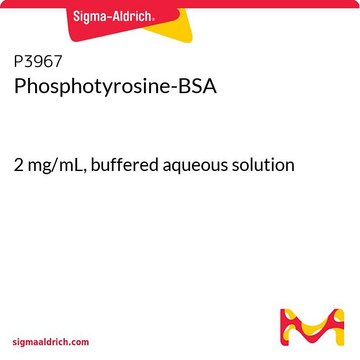Wszystkie zdjęcia(1)
Kluczowe dokumenty
P3717
Phosphoserine-BSA
2 mg/mL, buffered aqueous solution
Synonim(y):
Phosphoserine Antibody Inhibitor
Zaloguj sięWyświetlanie cen organizacyjnych i kontraktowych
About This Item
Polecane produkty
sterylność
non-sterile
Poziom jakości
Postać
buffered aqueous solution
stężenie
2 mg/mL
Warunki transportu
dry ice
temp. przechowywania
−20°C
Opis ogólny
The activity of proteins depends on phosphorylation of specific amino acid residues. In applications involving identification of activated cellular proteins, it is important to confirm specificity of antibodies used against a particular phosphorylated amino acid. For such applications, inhibitors of phosphorylated antibodies on specific amino acid residues are suitable. Phosphoserine antibody inhibitor may be used for the specific inhibition of the reactivity of anti-phosphoserine antibodies but not that of anti-phosphothreonine- or anti-phosphotyrosine-specific antibodies.
Specyficzność
O-phospho-L-serine conjugated to bovine serum albumin. Phosphoserine antibody inhibitor specifically blocks the reactivity of anti-phosphoserine antibody. It does not block the activity of anti-phosphothreonine or anti-phosphotyrosine-specific antibodies. The product is useful in immunoblotting and in ELISA.
Working dilution is at least 2 μg/ml by the specific inhibition of the reactivity of Monoclonal Anti-Phosphoserine (Sigma Product No. P3430), used in immunoblotting of rat cerebral cortex extract, and in ELISA.
Working dilution is at least 2 μg/ml by the specific inhibition of the reactivity of Monoclonal Anti-Phosphoserine (Sigma Product No. P3430), used in immunoblotting of rat cerebral cortex extract, and in ELISA.
Zastosowanie
Phosphoserine-BSA may be used for specific inhibition of monoclonal anti-phosphoserine (Sigma Product No. P3430) in immunoblotting and ELISA applications, at a working dilution of 2 μg/mL.
Postać fizyczna
Solution in 0.01 M phosphate buffered saline, pH 7.4, containing 15 mM sodium azide.
Oświadczenie o zrzeczeniu się odpowiedzialności
Unless otherwise stated in our catalog or other company documentation accompanying the product(s), our products are intended for research use only and are not to be used for any other purpose, which includes but is not limited to, unauthorized commercial uses, in vitro diagnostic uses, ex vivo or in vivo therapeutic uses or any type of consumption or application to humans or animals.
Ta strona może zawierać tekst przetłumaczony maszynowo.
Kod klasy składowania
10 - Combustible liquids
Klasa zagrożenia wodnego (WGK)
WGK 3
Temperatura zapłonu (°F)
Not applicable
Temperatura zapłonu (°C)
Not applicable
Certyfikaty analizy (CoA)
Poszukaj Certyfikaty analizy (CoA), wpisując numer partii/serii produktów. Numery serii i partii można znaleźć na etykiecie produktu po słowach „seria” lub „partia”.
Masz już ten produkt?
Dokumenty związane z niedawno zakupionymi produktami zostały zamieszczone w Bibliotece dokumentów.
Motoyuki Ogawa et al.
Biochemical and biophysical research communications, 304(4), 676-683 (2003-05-03)
Paxillin has been recognized as a focal adhesion adapter protein that participates in the integrin-mediated signaling. An earlier study [Ogawa et al. Biochim. Biophys. Acta 1519 (2001) 235] found that frog paxillin was expressed in the kidney epithelial cell line
Birte Schulenberg et al.
Electrophoresis, 25(15), 2526-2532 (2004-08-10)
Protein phosphorylation plays a vital role in the regulation of most aspects of cellular activity, being key to propagating messages within signal transduction pathways and to modulating protein function. Pro-Q Diamond phosphoprotein gel stain is suitable for the fluorescence detection
Matthew G Vander Heiden et al.
Science (New York, N.Y.), 329(5998), 1492-1499 (2010-09-18)
Proliferating cells, including cancer cells, require altered metabolism to efficiently incorporate nutrients such as glucose into biomass. The M2 isoform of pyruvate kinase (PKM2) promotes the metabolism of glucose by aerobic glycolysis and contributes to anabolic metabolism. Paradoxically, decreased pyruvate
Nasz zespół naukowców ma doświadczenie we wszystkich obszarach badań, w tym w naukach przyrodniczych, materiałoznawstwie, syntezie chemicznej, chromatografii, analityce i wielu innych dziedzinach.
Skontaktuj się z zespołem ds. pomocy technicznej




